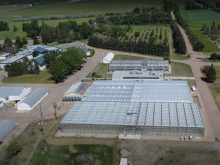Saskatchewan hunters have been offered free permits to shoot deer and submit the heads to be tested for chronic wasting disease.
Two cases of CWD were confirmed earlier this year in wild mule deer killed in the Manito Sand Hills area of northwestern Saskatchewan.
Because of the positive tests, the provincial environment department has closed wildlife management zone 46 to regular mule and white-tailed deer hunting this fall.
Instead, hunters in the zone will use the CWD control permits to kill deer, but they must submit the heads for testing.
Read Also

Alberta crop diversification centres receive funding
$5.2 million of provincial funding pumped into crop diversity research centres
Hunters can freeze the meat until they get the test results back from the deer they shot.
Farmland owners within zone 46 will have the first opportunity to get the permits between Nov. 5 and 17. After that, until Dec. 1, residents living within the zone or in the communities of Senlac, Marsden, Neilburg, Wilbert, Unity, Evesham, Baldwinton and Macklin will be able to get the permits.
Saskatchewan environment officials will then decide if permits will be available to others.
Officials hope to reduce the deer herd by 60 percent within a 16-kilometre radius of the location of the two positive tests. That would simulate natural mortality after a severe winter.
In the rest of zone 46, they intend to collect 450 mule deer and 550 white-tailed deer samples.
In several other areas of the province, a limited number of CWD control permits will be made available during the regular hunting season. Hunters are also welcome to submit heads from animals taken anywhere in the province.
Hunters and landowners should contact the provincial environment department for more information.















